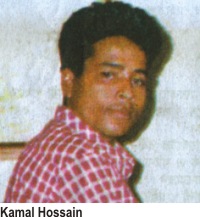Perspective
Silencing
Another Voice of Truth
Shamim
Ahsan
It
was the early hours of Sunday on August 22. The people of
Moddhompara in Tintohori Bazar in Manikchori under Khagrachori
district were fast asleep. At around 1.30 am Abul Bashar,
a local VDP member, called Kamal Hossain, the Khagrachori
correspondent for the Bangla daily Ajker Kagoj. The
call at such an unearthly hour made Kamal suspicious and he
chose not to respond. His premonition came true when, a few
minutes after Bashar's call, a gang of 15 to 20 masked, armed
terrorists, started to hit the door with shovels. Kamal quickly
hid on the roof. The weak wooden door was soon broken open
and in came the murderous youths. When they couldn't find
Kamal they got hold of his younger brother Zakir Hossain and
started beating him. When his wife and mother came to stop
them they were also brutally beaten. The ornaments she was
wearing were also snatched away. Then the goons grabbed Kamal's
two-year-old child Shahin and threatened to kill him if Kamal
didn't come out of his hiding. It worked. The hapless father
this time showed up to secure his son's life. They then tied
his hands on his back, beat him up mercilessly and finally
took him out with them to a jungle.
Twenty-eight
year old Kamal never returned home. After some 6 hours at
around 8 am, Kamal's beheaded body was found at a Kochukhet
beside Kontamara hill, about two kilometres away from his
home.
 As
the news of Kamal's brutal murder spread out hundreds of people,
specially the local journalists, rushed to Manikchori Thana
to see the dead body. What followed is nothing new. Angry
protesters, comprised of people from all walks of life demanded
to identify the killers and give them exemplary punishment.
The incensed local journalists community expressed their deep
shock at the incident, wore black badges and announced other
programmes in protest of the killing. Different journalists
forums based in Dhaka have also condemned the killing in the
strongest words. The victim's family was showered with sympathy
and condolence messages from different political and social
groups. Rani Nihar Devi Government High School and the Government
Primary School in Manikchori Sadar were instantly declared
closed for the day. As
the news of Kamal's brutal murder spread out hundreds of people,
specially the local journalists, rushed to Manikchori Thana
to see the dead body. What followed is nothing new. Angry
protesters, comprised of people from all walks of life demanded
to identify the killers and give them exemplary punishment.
The incensed local journalists community expressed their deep
shock at the incident, wore black badges and announced other
programmes in protest of the killing. Different journalists
forums based in Dhaka have also condemned the killing in the
strongest words. The victim's family was showered with sympathy
and condolence messages from different political and social
groups. Rani Nihar Devi Government High School and the Government
Primary School in Manikchori Sadar were instantly declared
closed for the day.
A case
was lodged on behalf of the victim's family but no name was
mentioned in the complaint.
Additional
District Magistrate Aminul Huq has visited the place and ASP
(Additional Superintendent of Police) Shantonu consoled the
protesting crowds saying the police drive to catch the killers
was already on. Four days into the murder no one has yet been
arrested. In fact there was no follow up news of the case.
It's the
same pattern being played out again and again--a murder followed
by fierce condemnation and demands for exemplary punishment
of the culprits, a half hearted coverage in the media, a few
sighs of dismay from readers and then it all becomes a forgotten
incident. But the fact remains that this is another step backward
for a supposedly free press. Intimidation of journalists has
been a common trend during both AL and BNP rule. The brutal
murders of Shamsur Rahman in Jessore, BBC stringer Manik Saha,
Humayan Kabir Balu, editor of Khulna-based Janmabhumi and
the vicious attacks on countless other journalists who somehow
managed to survive, continue to haunt the journalist community.
Most of the intimidation takes place far away from the capital
where media persons take unbelievable risks to write the truth
and protest against the mafia activities that thrive in remote
regions. Both AL and BNP governments have made tall promises
about upholding democratic values, one of which is to keep
the media free and vibrant. But the continuous and frequent
cases of repression of journalists, whether through direct
attacks and murders or indiscriminate arrests, are proof of
the fact that they have done virtually nothing to live up
to such claims. We do not need the CPJ (Committee to Protect
Journalists) to tell us that Bangladesh is the most dangerous
place in all of Asia for journalists. Kamal's chilling assassination
and the murders of many others leaves no doubt about the basis
of such a label.
Copyright
(R) thedailystar.net 2004
|
